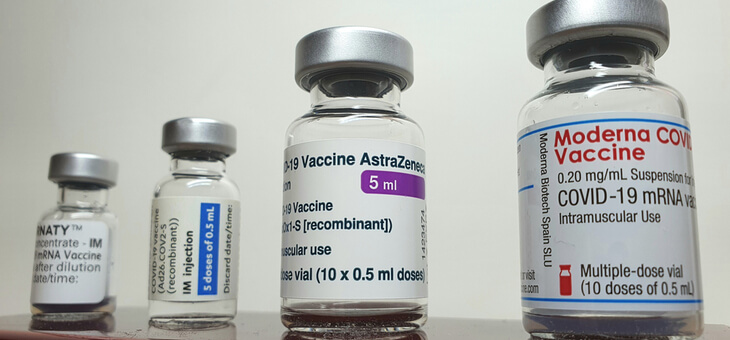Older Australians worried about the effects of AstraZeneca now have more vaccines available to them, with Pfizer and Moderna lines opened to over 60s as of Friday.
All three vaccines are now available regardless of state or territory of residence, says health minister Greg Hunt.
Including the mRNA vaccine options could help more than 300,000 older people who have been waiting to get vaccinated.
“Around Australia, over 60s will be able to access Moderna and Pfizer … wherever they are,” says Mr Hunt.
“That will mean that for those remaining, they in a position to access [a vaccine], whether it’s AstraZeneca, whether it’s Pfizer, whether it’s Moderna.
“If you’re 12 and over, it doesn’t matter what age you are, you can access an mRNA vaccine in Australia.
“That just gives more options for more Australians… There should be no barrier for any older Australian stepping forward to receive a vaccination.”
People aged 12 and over will now be able to get Moderna from a pharmacist and Pfizer from a GP, pending availability.
Australia’s vaccine rollout has been hampered by advice that people aged 50 and under should receive Pfizer vaccines due to a higher risk of rare blood clots caused by AstraZeneca.
AstraZeneca was still recommended for older Australians, but the advice created hesitancy with some believing their lives would be at risk if they received anything but an mRNA vaccine.
Read: Older Australians waiting for mRNA vaccines at back of the queue
Regardless of the concerns of Australians over 50, the government stood by AstraZeneca as a “world-class vaccine”, but admitted that “indicative” figures showed more than 300,000 people still “may have been waiting” for mRNA vaccines.
“Obviously, we’ll see in the coming weeks how many of those take it up,” says Mr Hunt.
He says 94.6 per cent of people aged over 70 have been vaccinated, mostly with AstraZeneca.
“Our view has always been we have an outstanding world-class vaccine in AstraZeneca, which is available in over 170 countries and has been the backbone of the UK program,” he says.
“Having said that, this is the opportunity for every person to come forward no matter what previous hesitations they may have had.
“Have confidence in these vaccines. These vaccines – AstraZeneca, Pfizer, Moderna – can save your life.”
Read: Mild side-effects to long-term protection: How COVID-19 vaccines work
The announcement comes as nurses described unvaccinated patients “begging” to be vaccinated before being placed on life support.
Some of these patients were fit and healthy prior to contracting COVID-19.
“One of the saddest things I’ve seen over the last few weeks is people wanting the vaccination just before we put them on a life support machine,” Royal Melbourne Hospital ICU nurse unit manager Michelle Spence told the ABC.
“That is the absolute truth. I’ve seen it myself. They’re begging for the vaccination.
“They’re very young. And once we get to that, we’re about to put them on life support, it is really too late.
“And we hold their hands, while their families have to be at home.
“And that is absolutely not what this should be about. Loved ones deserve to have their families with them when they die.”
Ms Spence says patients being vaccinated may have changed many negative outcomes, as was the case for a tradesman in his 30s last week.
“The only thing I can tell you that would have changed, and again, this is my opinion, I’ve seen it at the end of the bed, is the fact that he was not vaccinated,” she said.
“So here is an opportunity for that ICU patient to have never met us.”
Nursing manager Jacqui Harper lamented the speed at which COVID brings down otherwise healthy people, saying patients she sees coming into the hospital were “seriously, seriously ill”.
“The clinical deterioration is so sudden. One minute, sitting in a chair, an hour later they could be saying their goodbyes,” she said.
“They find it difficult to breathe, some needing high levels of oxygen, ventilators and ICU support.
“Many regret not being vaccinated earlier.”
Read: COVID booster jabs needed for older Australians: vaccine body
Increased vaccination rates would also relieve the strain on hospital staff – a mantra repeated time and again by state leaders.
“To be a nurse right now? Very challenging. Very challenging when the community are not getting vaccinated,” says Ms Harper.
“We have got to do all those other things. We have to do the orthopaedic traumas that come through. All of the other cases we get as well.
“… and being in that epicentre, it’s been hard.
“Many nurses don’t know that this is what they want to do any more. But we will get through.”
Healthcare workers are bracing for when lockdowns lift, saying that while it would be a great time for the community, it will significantly strain the healthcare system.
“I’m not going to lie to you. People are worried about the next few months,” says Ms Spence.
Both Ms Spence and Ms Harper said their respective wards were already at, or nearing, full capacity.
The pair agreed that the more people who were vaccinated, the less likely the system would break under the weight of reopening.
Have you been waiting for Pfizer or Moderna, or were you okay with AstraZeneca? Now these new options are available, is there any other reason you would not be vaccinated? Why not share your opinions in the comments section below?
If you enjoy our content, don’t keep it to yourself. Share our free eNews with your friends and encourage them to sign up.

